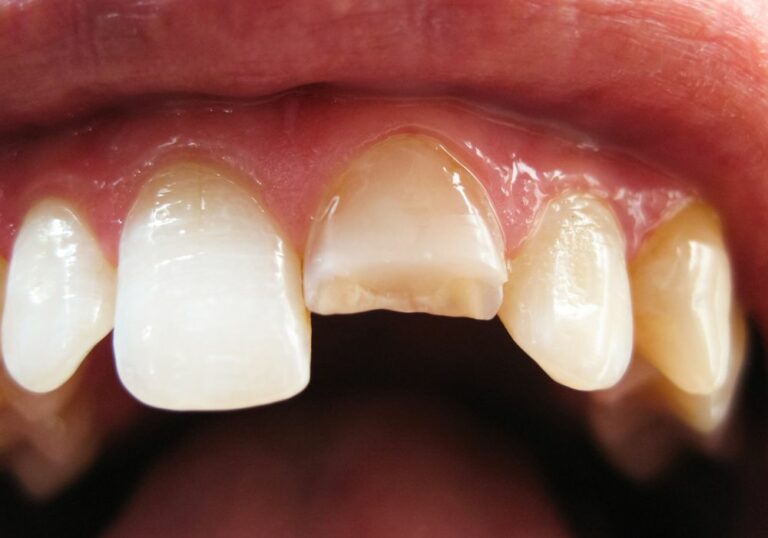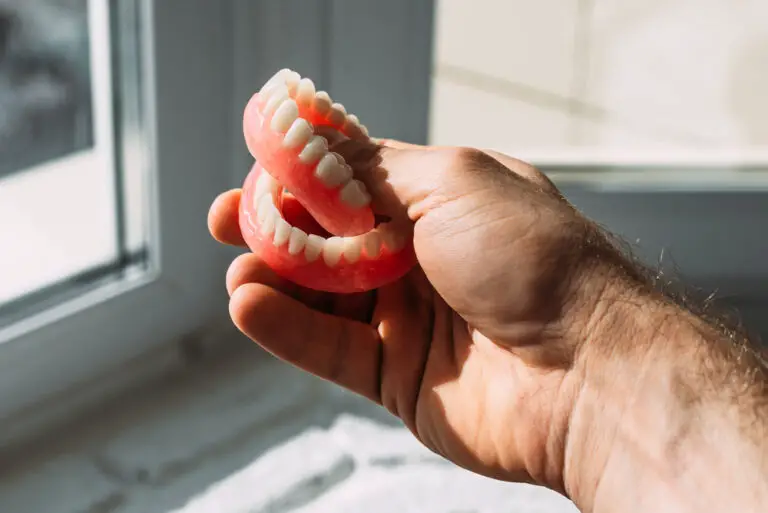Teething is an exciting milestone for infants, but parents often wonder why there is so much variability in when babies get their first teeth. While the typical range is between 6-12 months, some babies sprout pearly whites sooner. So what factors influence early teething?
Genetics Play a Major Role
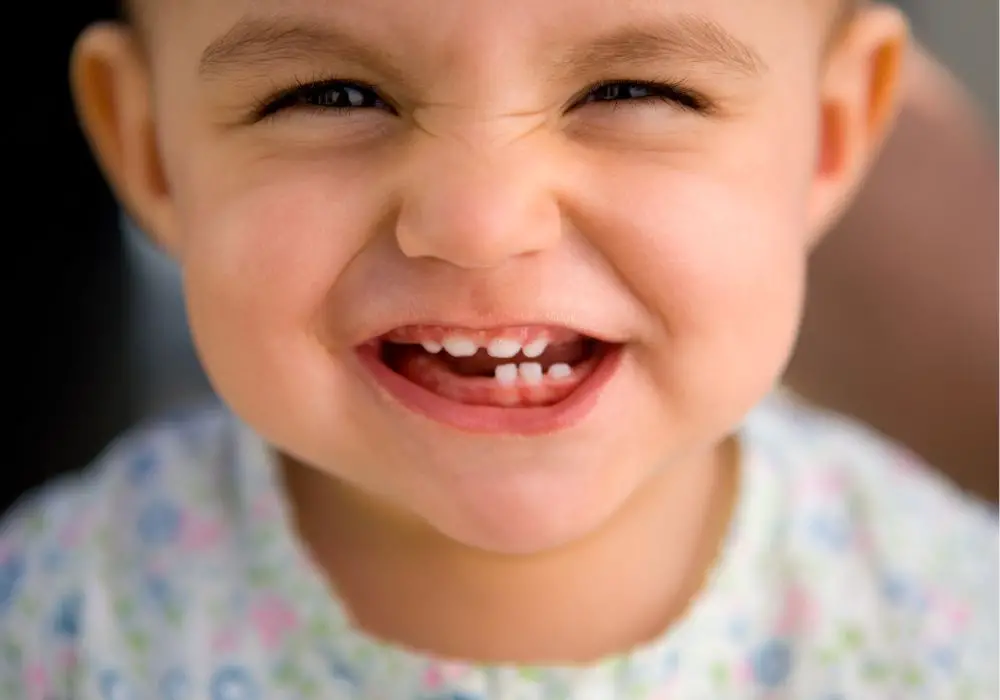
One of the biggest determinants of when a baby starts teething is genetics. Studies show that when one or both parents were early teethers as infants, their children are very likely to be as well.
This inheritance pattern makes sense when you consider how new teeth develop. The genes passed down from parents provide the blueprint for when tooth buds begin forming in utero and the pace at which teeth then mineralize and erupt through the gums.
If a parent’s genetic code was programmed for teeth to develop early, the same timeline may occur in their offspring.
Research has found that nearly 80% of babies who got teeth at 4 months had at least one parent who also teethed early before 6 months. The earlier the parent’s first tooth emerged, the more likely their baby was to follow a similar fast track for getting first teeth.
So if you were born with teeth at 3 or 4 months, chances are high your children will start teething on the early side too. The body’s innate genetic timing for forming pearly whites is passed on through generations.
Nutrition Provides the Building Blocks
What babies eat in the first year of life also impacts when their first gleaming teeth peek through swollen gums. Infants who are exclusively breastfed tend to teethe later, while babies who get formula and solids teethe earlier.
This is because breastmilk alone does not contain adequate amounts of certain key nutrients needed for developing strong, healthy teeth. Vitamin D, calcium, and phosphorus are crucial building blocks, but breastmilk is naturally low in these tooth-supporting compounds.
Formula and fortified infant cereals are rich sources of these dental nutrients. When babies get these tooth-building supplements in addition to breastmilk, their tiny tooth buds often calcify and push through faster.
Multiple studies have shown a clear association between the early introduction of solids and formula and earlier eruption of the first tooth. Babies who consume these items get an added nutritional boost that accelerates teething.
So if you want to ensure your infant hits this milestone sooner, supplementing with formula, cereals, and purees starting around 4-6 months provides the foundation. Good nutrition jumpstarts the teething process.
Birth Factors Signal Maturity
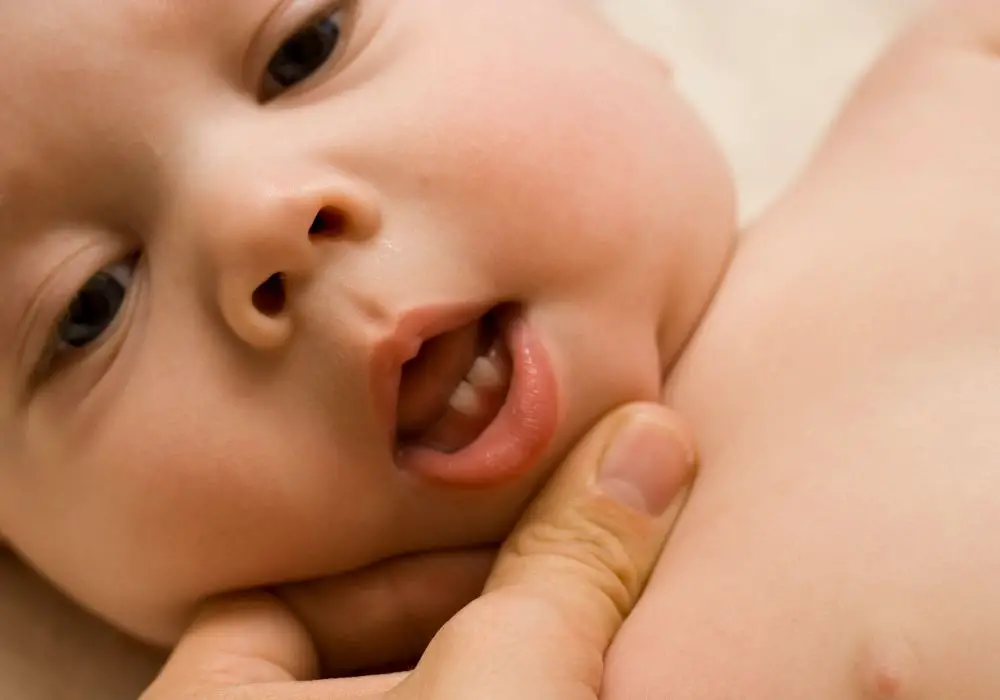
A baby’s weight and gestational age at birth also correlate with eruption times for first teeth. Infants born prematurely tend to be early teethers, while full-term babies teethe later.
Studies have found that babies born before 37 weeks have up to double the chance of getting teeth before 6 months compared to full-term infants. Shorter time in utero is linked to earlier first tooth emergence after birth.
Lower birth weight also predicts earlier teething. The smaller and less developed the newborn, the sooner teeth tend to come in after birth. These low birth weight babies receive extra nutrients and growth encouragement, which may bolster tooth development.
So early birds who arrive sooner and smaller start teething a bit earlier too. Their age and size at birth signals their bodies are primed for rapid development – teeth included!
Girls Mature Faster
Interestingly, a baby’s gender also seems to play a role in teething timelines. Multiple studies have found that girl infants tend to teethe around 1 month earlier than boys.
In a study of over 2000 babies, researchers discovered the average age for getting the first tooth was 7.35 months for girls versus 8.28 months for boys. This held even when controlling for factors like birth weight and maternal age.
While more research is needed, experts believe female sex hormones like estrogen may accelerate dental development. The surge of mom’s estrogen to female infants in utero has lasting effects on timing for teething and other milestones.
So being born a girl appears to fast-track reaching this childhood achievement!
Health & Development Set the Pace
A baby’s overall health and physical development also influence when teething begins. Infants who are strong and active with advanced motor skills tend to teethe sooner.
Preemies or babies with chronic medical conditions, congenital disorders, and developmental delays typically get first teeth later than infants developing normally. Any factor that slows weight gain or physical progress can extend the teething timeline months later than average.
Conversely, healthy robust babies who hit physical milestones for crawling, standing, and walking early are primed for early teething as well. The baby’s innate maturation pace helps dictate emergence of the first pearly whites.
So while each child develops on their own clock, supporting optimal health and motor skills paves the way for reaching early teething.
Don’t Believe Teething Myths
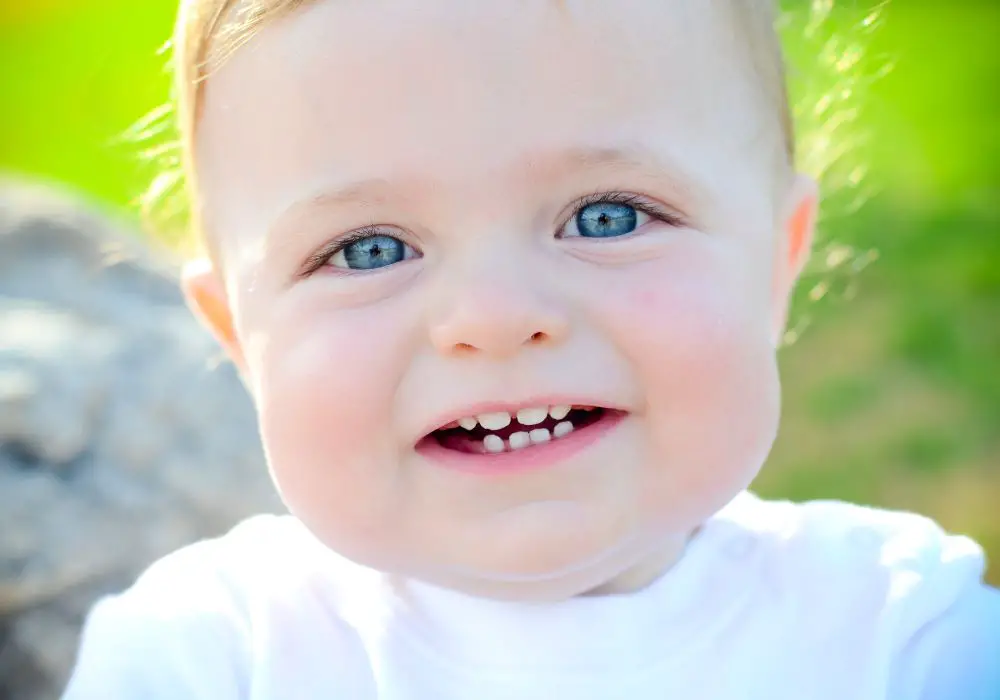
There are many myths floating around about what influences a baby teethe sooner or later. But factors like illness, temperature, intelligence, and diet have no proven tie to teething timelines.
For example, many assume that low vitamin C or cold exposure causes late teething. Or that advanced smarts spur early teething. But scientific evidence disproves these old wives’ tales.
Stick to the factors backed by research, like family genes, birth stats, gender, and development. Many suggested teething influences are not supported by data, so don’t put stock in myths. Focus on what matters most for your baby.
Should You Worry About Early Teething?
Many parents have concerns if their baby seems to teethe earlier or later than peers. But rest assured early teething is not good or bad overall. It poses no known risks or benefits to an infant’s health or development.
Babies who cut teeth first at 3 or 4 months do not have an easier time teething or fewer issues than those who teethe at 9 months. Timing is primarily based on genetic luck of the draw.
And early teething predicts nothing about future dental health or smile. It simply means your baby’s body is ready a bit sooner for this childhood rite of passage – and that’s perfectly okay.
Unique Considerations for Caring for Early Teeth
While early teething is normal, here are some tips for handling newborns with new teeth:
Start cleaning immediately
Even before other teeth come in, cavities can start in the first emerging teeth if not cleaned. But babies lack the dexterity to brush well until around 12 months.
Gently clean new teeth twice per day with water and a soft baby toothbrush. Seek advice from your pediatric dentist and use fluoride toothpaste on any infant teeth as soon as they erupt. Good hygiene prevents decay.
Watch for biting during feedings
New teeth can damage breast tissue or bottle nipples during nursing. Pay close attention to latch and positioning. Use a clean finger to keep front teeth away from the nipple and areola if needed.
If biting occurs, stop and readjust. Try again in a few minutes if baby remains hungry. Frequent biting may necessitate transitioning sooner to a cup for safety.
Introduce appropriate foods and utensils
New teeth indicate readiness for solids and self-feeding. Let your early teether’s cues guide when to start different foods and transition to a sippy cup or straw.
Offer soft, tooth-safe foods easy to gum and swallow. Equip baby with “grown up” utensils suited for first teeth to promote dexterity and confidence. Respect teething milestones when introducing new feeding experiences.
Consult Your Pediatrician With Concerns
While most early emergence of teeth is normal, do consult your pediatrician if:
- Teeth are already present at birth or emerge within the first 3 months of life. This is atypical and may signal an underlying disorder.
- No teeth appear by 12-14 months or more than 4 teeth have already erupted by 9 months. Timelines far outside norms warrant evaluation.
- Teeth appear discolored, abnormally shaped, crooked or loose. These may indicate enamel defects or other dental issues needing intervention.
- Teething is accompanied by fever over 100.4°F, diarrhea lasting more than a day or two, decreased appetite lasting longer than 24 hours, or facial swelling suggesting infection. Seek help determining the cause.
When in doubt, check with your child’s doctor to discuss any unusual characteristics or symptoms associated with early teething. While most cases are harmless, some warrant further assessment for treatment needs. Speak up about any concerns.
Soothing Early Teething Pain
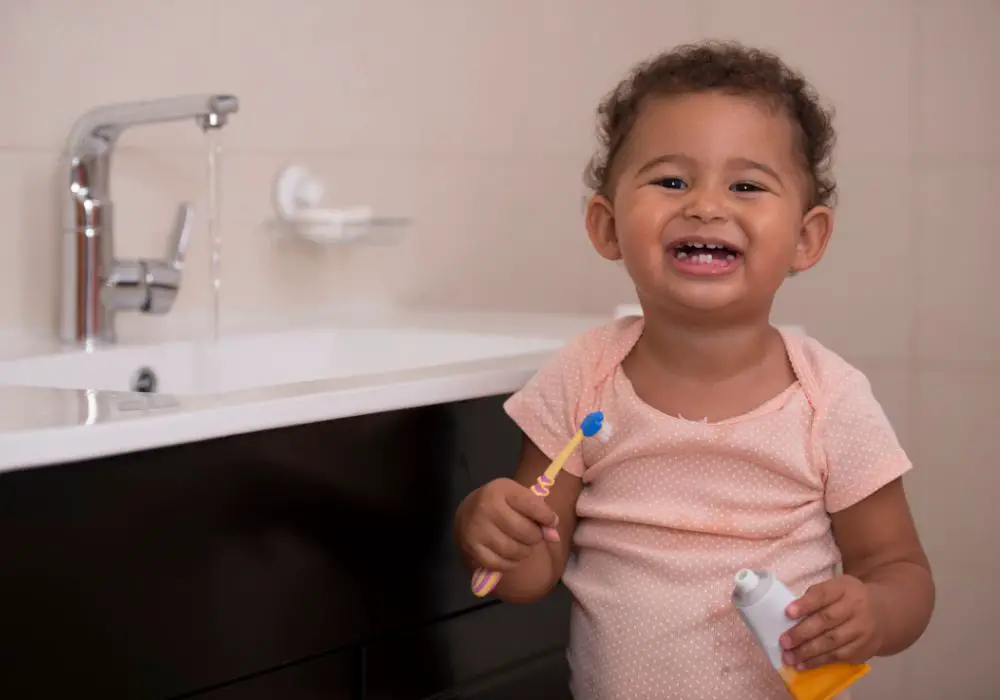
No matter when teething starts, some degree of soreness and crankiness often ensues. Here are proven ways to relieve an early teether’s discomfort:
- Gently rub swollen gums with clean fingers, a soft cloth, or baby toothbrush before and after feeding. Pressure counters sensitivity from erupting teeth.
- Allow baby to gnaw on a chilled (not frozen) wet washcloth or safe rubber teether. The cold temperature slightly numbs painful gums. But avoid actual ice or freezer gel packs which can damage infant skin.
- Use over-the-counter pain relievers like baby acetaminophen or ibuprofen as approved by your pediatrician and directed on packaging. These ease inflammation for several hours, promoting rest.
- Distract baby with songs, stories, cuddles and fun toys to shift focus away from mouth pain. Engagement and positive stimulation help tolerate discomfort.
- Ensure your early teether gets lots of daytime rest and enough sleep. Growing new teeth is exhausting work! Extra naps enable the body to recharge.
If pain seems severe and persists despite these measures, do consult your pediatrician for other options. Most babies weather early teething storms with minimal intervention. But seek help easing pain that interferes with eating, sleeping or normal behavior.
Frequently Asked Questions
Here are answers to some other common questions about early teething:
How many teeth do most babies get in the first year?
Most infants get 8 teeth between 6-12 months – 4 lower front teeth followed by 4 upper front teeth. Early teether may get these sooner than 6 months. Late teethers may not get a full set until after their 1st birthday. But 8 total is standard.
In what order do baby teeth usually come in?
Beyond lower then upper front teeth, the general order is:
- First molars (back teeth) between 10-14 months on bottom, 12-18 months on top
- Canines (pointed side teeth) between 16-22 months on top and bottom
- Second molars (rearmost teeth) between 20-33 months on bottom and top
This sequence varies. But the full set of 20 baby teeth typically emerges between 24-30 months.
Is it okay to pull out a really loose baby tooth?
No! Baby teeth are meant to fall out naturally around age 6 as adult teeth emerge. It’s normal for teeth to loosen as permanent teeth develop under the gums. Only gently wiggle very loose teeth – never pull or yank little teeth as this can damage the permanent teeth growing below.
Can teething cause sleep regressions?
Discomfort may disrupt sleep around teething periods. But teething itself does not directly cause sleep regressions, which actually stem from brain development. Focus on instituting good sleep habits consistently, independent of teething phases. Some regressions are unavoidable.
Do teething necklaces or tablets work?
The effectiveness of amber teething necklaces and OTC teething tablets is unproven. The FDA warns against using teething jewelry due to choking risks. And certain tablets faced recalls after causing belladonna toxicity in infants. Most pediatricians recommend using safer alternatives like cold teethers for teething relief.
We hope this detailed guide covers all you need to know about early teething! While every baby develops differently, understanding the factors that influence teething timelines will help you support your little early teether. With some extra care and preparation, your baby will take this milestone in stride, no matter how soon those first pearly whites appear!



